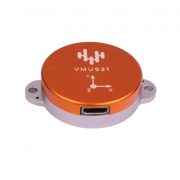|
vmu931
Library for Variense VMU931 IMU
|
|
vmu931
Library for Variense VMU931 IMU
|
This is C library for communication with Variense VMU931 inertial measurment unit.

Library works on Unix platforms (e.g. Linux).
Library was written for VMU931 and tested with firmware 1.0.1
Library implements full functionality as defined in VMU931 User Guide 1.3 for firmware 1.0.1.
| Functionality | Library functions |
|---|---|
| init and cleanup | vmu_init, vmu_close |
| enabling/disabling sensor streams | vmu_stream |
| setting resolutions | vmu_resolution |
| reading data from the device | vmu_accel, vmu_gyro, vmu_mag, vmu_euler, vmu_quat, vmu_head, vmu_read_all |
| selftest and calibration routines | vmu_selftest, vmu_calibrate |
| device status | vmu_status |
Library was designed to retrieve readings history (not only the latest reading).
Library documentation.
``` bash
sudo apt-get update sudo apt-get install build-essential git
git clone https://github.com/bmegli/vmu931.git
cd vmu931 make all ```
Run vmu931-euler with your device, e.g.:
```bash ./vmu931-euler /dev/ttyACM0 ```
Run vmu931-read-all with your device, e.g.:
```bash ./vmu931-read-all /dev/ttyACM0 ```
Run vmu931-estimate-bias with your device and number of seconds, e.g.:
```bash ./vmu931-estimate-bias /dev/ttyACM0 10 ```
There are two calibration procedures:
To trigger calibration command you can use vmu931-calibrate example:
```bash ./vmu931-calibrate /dev/ttyACM0 ```
Magnetometer calibration is not documented in the VMU931 User Guide 1.3.
While powering up the sensor move it around in multiple orientations until the Euler angles indicates 0 degrees while the sensor has its Y axis pointing North. As of firmware 1.01 this has to be repeated every time you power on the sensor.
More details on wiki.
See examples directory for more complete examples with error handling.
Library documentation.
```C struct vmu *vmu = NULL; struct vmu_text text;
vmu = vmu_init("/dev/ttyACM0"); vmu_calibrate(vmu, &text); vmu_close(vmu); ```
```C int ret; struct vmu *vmu = NULL; struct vmu_txyz euler_data[10];
vmu = vmu_init("/dev/ttyACM0"); vmu_stream(vmu, VMU_STREAM_EULER);
while( (ret = vmu_euler(vmu, euler_data, EULER_DATA_SIZE) ) != VMU_ERROR ) { for(int i=0; i<10 && i<ret;++i) printf("t=%u x=%f y=%f z=%f\n", euler_data[i].timestamp_ms, euler_data[i].x, euler_data[i].y, euler_data[i].z); }
vmu_close(vmu);
```
```C struct vmu *vmu=NULL; struct vmu_txyz euler_data[10]; struct vmu_txyz mag_data[10]; struct vmu_txyz accel_data[10];
struct vmu_data data={0}; struct vmu_size size={0};
size.accel = size.mag = size.euler = 10;
data.euler = euler_data; data.mag = mag_data; data.accel = accel_data; data.size = size;
vmu = vmu_init("/dev/ttyACM0"); vmu_stream(vmu, VMU_STREAM_EULER | VMU_STREAM_MAG | VMU_STREAM_ACCEL);
while( vmu_read_all(vmu, &data) != VMU_ERROR ) { for(int i=0;i<data.size.euler;++i) printf("[euler] t=%u x=%f y=%f z=%f\n", data.euler[i].timestamp_ms, data.euler[i].x, data.euler[i].y, data.euler[i].z);
for(int i=0;i<data.size.mag;++i) printf("[mag] t=%u x=%f y=%f z=%f\n", data.mag[i].timestamp_ms, data.mag[i].x, data.mag[i].y, data.mag[i].z);
for(int i=0;i<data.size.accel;++i) printf("[accel] t=%u x=%f y=%f z=%f\n", data.accel[i].timestamp_ms, data.accel[i].x, data.accel[i].y, data.accel[i].z);
data.size=size; }
vmu_close(vmu); ```
C ``` bash gcc vmu931.c your_program.c -o your-program ```
C++ ``` bash gcc -c vmu931.c g++ -c your_program.cpp g++ vmu931.o your_program.o -o your-program ```
Library is licensed under Mozilla Public License, v. 2.0
This is similiar to LGPL but more permissive:
Like in LGPL, if you modify this library, you have to make your changes available. Making a github fork of the library with your changes satisfies those requirements perfectly.